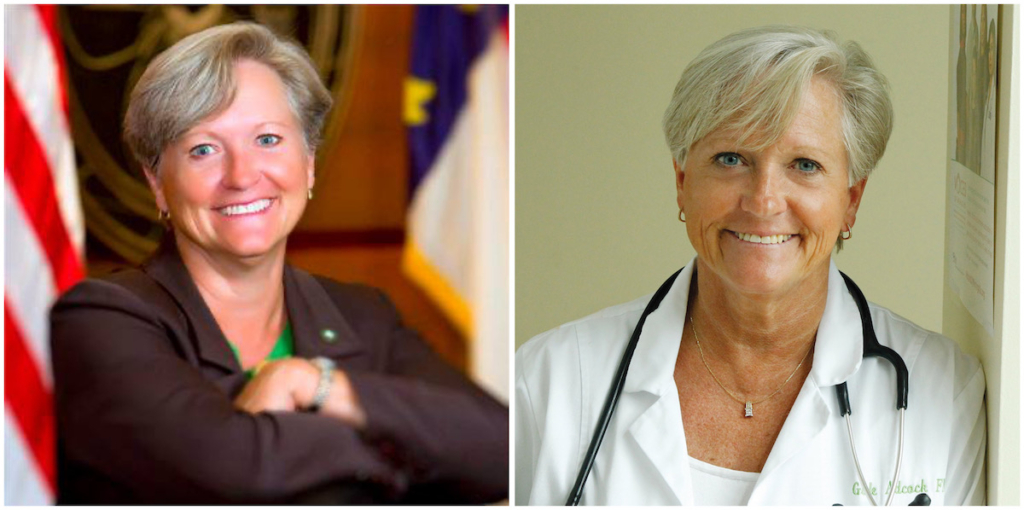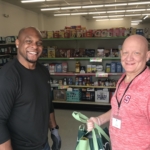Adcock: Caring for Others, and for Ourselves
Cary, NC – Latest from the blog of NC Representative Gale Adcock, who is also a nurse.
Caring for Others, and for Ourselves
Dear friends,
I hope that you are well, practicing the recommended social distance of 6 feet, getting outside for fresh air and sunshine, and staying in touch with family and friends by phone and virtually. I hope that you have not been personally affected by COVID-19. You haven’t heard from me until now because for the last 3 1/2 weeks, I have been on the front lines of the clinical response to this pandemic.
Most of you know that I’m a nurse practitioner in family practice at SAS Institute in Cary, NC. Our practice, like all other primary care providers, must be available for our patients who have symptoms suggestive of COVID-19, but also to treat other acute illnesses like flu and strep throat, monitor chronic illnesses like diabetes and hypertension, give immunizations to children and adults, and manage other aspects of our patients’ health.
Because COVID-19 has been fast-moving, guidance to health care providers from the Centers for Disease Control and Prevention (CDC), the North Carolina Department of Health & Human Services (DHHS) and Wake County Health & Human Services has slightly changed almost daily. Like other providers, our practice closely monitors health authorities’ recommendations for patient screening, testing and self-quarantine as well as best practices for protecting health care workers who care for and test them. My full time professional job has been more than full time since early March. I’ve thought of you many times, especially over the last month.
Since January
The legislature has been out of session since January 14 with plans to return on April 28 for the short session. Whether and how we will convene is still to be determined. In February I virtually attended 2 DHHS legislative oversight committee meetings and visited Janet Pride’s 4th-grade class at Alston Ridge Elementary School to talk about how laws are made at the state level. It is very refreshing to answer thoughtful questions from 10-year-olds.
When COVID-19 entered the US, everyone’s time and attention shifted, including mine. Since early March I’ve participated in several calls a week conducted specifically to update legislators and answer our questions. These calls are led by Dr. Mandy Cohen, DHHS Secretary along with the leaders of NC Public Safety and Emergency Operations. Governor Cooper is also often on these calls. Also I have been appointed by Speaker Moore to the House Select Committee on COVID-19. Citizen input is welcomed; send comments and concerns here. Comments are shared with committee members weekly. Our first virtual meeting was held last week and we meet again on April 2 at 10:00. Listen to our meetings by clicking 1228 LB.
Information You Can Depend On
Like you, I want information about COVID-19 from experts and individuals on the front lines. Hard decisions have been made to protect our citizens and lessen the chances that our hospitals will be overwhelmed by a surge of acutely ill COVID-19 patients. Statistics change daily. Links included in this issue are for reliable sources you can access when you want and need information.
- On March 27 Governor Cooper issued Executive Order 121, a statewide Stay at Home Order beginning Monday, March 30 at 5 p.m. until April 29, 2020. The Executive Order directs people to stay at home except to visit essential businesses, to exercise outdoors or to help a family member. The order bans gatherings of more than 10 people and directs everyone to physically stay at least six feet apart from others. Find the list of ‘essential businesses’ and other details in this press release and related FAQs.
- Governor Cooper’s website has a list of actions he’s taken to address COVID-19 and its economic impacts (these are listed in reverse chronological order). It includes Executive Orders that closed schools (initially until March 30, then extended to May 15), banned sit-down service at restaurants and bars, extended the tax deadline to July 15 and waived rules for unemployment benefits.
- The COVID-19 Case Count lists cases in the state and by county, as well as the number of hospitalizations and deaths; it is updated by 11 a.m. daily. COVID-19 Response in North Carolina has links to resources and information for businesses & employers; child care; colleges, universities and schools; long term care facilities; health care providers; and workers who have lost their jobs, among others.
- For information about COVID-19 across the US and general information about symptoms, when to contact your health care provider and what you can do to safeguard your health and the health of your loved ones, I recommend the CDC.
Coping With our Current ‘New Normal’
While we’re staying at home except for permitted activities (receiving health care, picking up prescriptions, providing care to family members, shopping for food, outdoor exercise), it’s important to feel connected to others and to maintain good mental health. In addition to reading good books and streaming your favorite TV shows and movies, here are some online options for keeping anxiety and boredom at bay (list courtesy of Mike Stunson; some editorializing by me).
1. Exercise
Planet Fitness offers live workout videos daily on Facebook. Gold’s Gym has more than 600 free audio and video workouts until the end of May. Your own fitness center may also offer virtual workouts, yoga or meditation sessions.
2. Enjoy nature
You can use Google Earth to visit any national park online. Glacier National Park, Grand Canyon National Park, and the Great Smoky Mountains National Park are just some of the options.
3. Check out some animals
If you can’t see wildlife from your deck or window, the San Diego Zoo and Monterrey Bay Aquarium are showing live feeds of many of their exhibits.
4. Watch classic sports games
The NBA, NFL, NHL and MLB have opened their libraries so fans can watch games from years past.
5. Tour museums
Soak in some culture. Google’s Arts and Culture website offers tours of museums around the world, including the Tokyo National Museum and the Guggenheim. Virtual tours are also available of the Smithsonian Museum of Natural History.
6. Listen to music
More culture. The Metropolitan Opera streams a different encore presentation each night.
7. Learn to Cook
Better Homes & Gardens and the BBC have online videos featuring cooking tips.
8. Take a college course
Many course from Yale, Harvard, Princeton and Columbia are now available free. In January I took the popular Yale course, “The Science of Well-Being” taught by Professor Laurie Santos. Little did I know how helpful it would be in less than 2 months! If interested, enroll here.
A Final Word

Many of our fellow citizens have lost jobs and businesses because of closures required to slow the spread of COVID-19. This is a good time to help them by contributing to your favorite local non-profit. Two particularly on my radar right now are the Food Bank of Central & Eastern North Carolina and the NC Restaurant Workers Relief Fund.
I would not be a good nurse or legislator if I didn’t end this newsletter with advice you’ve likely memorized by now: wash your hands frequently with soap and water; cough and sneeze into your elbow; stay away from others if you feel sick; keep your distance from those who seem ill and from those seem healthy (6 foot rule) and call your health care provider if you have classic COVID-19 symptoms of fever with cough or shortness of breath.
To preserve COVID-19 testing supplies for the very ill and for at-risk front line health care workers, individuals with mild symptoms do not need to be tested. According to the CDC they can assume they have COVID-19 (since we know there is community spread) and are instructed to self-isolate for 7 days + 3 days following their last day of fever.
By taking care of yourselves and ‘staying at home’, you are also taking care of others. Be well.
Yours in service,
Gale
From the blog of NC District 41 Representative Gale Adcock.



